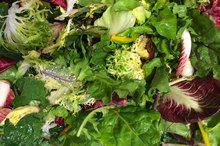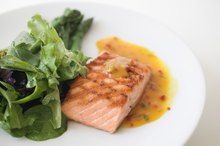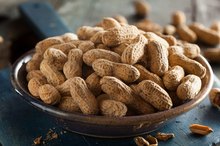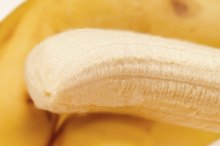Sources of Electrolytes
A healthy diet provides the electrolytes that your body needs to function properly. These electrically charged minerals help your muscles contract and your nerves transmit impulses. Electrolytes help your body maintain the proper fluid balance, and your kidneys work hard to keep electrolytes at the right level. Calcium, potassium, magnesium, phosphorus, sodium and chloride are the most common electrolytes. You lose electrolytes when you sweat, so they need replenishment during intense exercise or very warm weather.
Calcium
Calcium is the most abundant electrolyte mineral in your body, and it plays a crucial role in the health of your bones and teeth. Maintaining the proper calcium levels over the course of your lifetime plays an important role in protecting you against osteoporosis. Many foods contain calcium, but the richest sources include yogurt, collard greens, black-eyed peas and skim milk. An 8-ounce cup of plain yogurt contains 415 milligrams of calcium, while a cup of soy milk contains 93 milligrams.
- Calcium is the most abundant electrolyte mineral in your body, and it plays a crucial role in the health of your bones and teeth.
Potassium
How Much Potassium Does a Female Need?
Learn More
Potassium helps your body break down carbohydrates, maintain proper growth and regulate electrical activity of the heart. Potassium is found in a variety of foods. Good sources include red meat, chicken and fish. Vegetables such as broccoli, winter squash, tomatoes, lima beans and peas are also rich in potassium. Fruits high in calcium include bananas, kiwis, cantaloupe, apricots and citrus fruits.
- Potassium helps your body break down carbohydrates, maintain proper growth and regulate electrical activity of the heart.
- Fruits high in calcium include bananas, kiwis, cantaloupe, apricots and citrus fruits.
Magnesium
Every organ in your body relies on magnesium. It helps your body maintain the proper calcium, potassium, zinc, copper and vitamin D levels. It also helps your body produce energy. Good sources include nuts, whole grains, green leafy vegetables, blackstrap molasses and pumpkin and squash seeds
- Every organ in your body relies on magnesium.
- It helps your body maintain the proper calcium, potassium, zinc, copper and vitamin D levels.
Phosphorus
Does Potassium Aid in Weight Loss?
Learn More
Like calcium, phosphorus helps you maintain strong bones and teeth. It plays a role in the growth, repair and maintenance of your cells as well. It also helps your body produce energy from carbohydrates and fat. Fruits and vegetables contain very little phosphorous. Meats and milk products provide the primary sources of phosphorus in your diet.
- Like calcium, phosphorus helps you maintain strong bones and teeth.
Sodium and Chloride
While too much sodium can cause adverse health effects, a small amount of sodium is critical to your health. Sodium helps regulate blood volume and blood pressure. Foods such as milk, beets and celery contain naturally occurring sodium. However, sodium chloride, also known as table salt, is the most common form of sodium. While chloride is found in table salt, it is found naturally in foods such as seaweed, tomatoes, celery, and olives.
- While too much sodium can cause adverse health effects, a small amount of sodium is critical to your health.
- While chloride is found in table salt, it is found naturally in foods such as seaweed, tomatoes, celery, and olives.
Related Articles
References
- University of Maryland Medical Center: Calcium
- Harvard School of Public Health: Calcium Sources in Food
- University of Maryland Medical Center: Potassium
- University of Maryland Medical Center: Magnesium
- University of Maryland Medical Center: Phosphorus
- University of Maryland Medical Center: Sodium
- University of Maryland Medical Center: Chloride
- University of Maryland Medical Center: Electrolytes
- MedlinePlus: Electrolytes
- White ND. Messaging and Multivitamin Use: Rethinking the “It Can’t Hurt” Philosophy. Am J Lifestyle Med. 2019;13(3):243-245. doi:10.1177/1559827619826572
- Schüpbach R, Wegmüller R, Berguerand C, Bui M, Herter-Aeberli I. Micronutrient status and intake in omnivores, vegetarians and vegans in Switzerland. Eur J Nutr. 2017;56(1):283-293. doi:10.1007/s00394-015-1079-7
- Ghishan FK, Kiela PR. Vitamins and Minerals in Inflammatory Bowel Disease. Gastroenterol Clin North Am. 2017;46(4):797-808. doi:10.1016/j.gtc.2017.08.011
- Sorensen MD. Calcium intake and urinary stone disease. Transl Androl Urol. 2014;3(3):235‐240. doi:10.3978/j.issn.2223-4683.2014.06.05
- MedlinePlus. Magnesium in diet. Updated June 2, 2020.
- Schwalfenberg GK, Genuis SJ. The Importance of Magnesium in Clinical Healthcare. Scientifica (Cairo). 2017;2017:4179326. doi:10.1155/2017/4179326
- National Institutes of Health, Office of Dietary Supplements. Magnesium Fact Sheet for Health Professionals. Updated March 24, 2020.
- National Institutes of Health, Office of Dietary Supplements. Phosphorous Fact Sheet for Health Professionals. Updated March 2, 2020.
- Noori N, Kalantar-Zadeh K, Kovesdy CP, Bross R, Benner D, Kopple JD. Association of Dietary Phosphorus Intake and Phosphorus to Protein Ratio with Mortality in Hemodialysis Patients. Clin J Am Soc Nephrol. 2010;5(4):683-692. doi:10.2215/CJN.08601209
- National Institutes of Health, Office of Dietary Supplements. Potassium Fact Sheet for Health Professionals. Updated March 2, 2020.
- Weiss JN, Qu Z, Shivkumar K. Electrophysiology of Hypokalemia and Hyperkalemia. Circ Arrhythm Electrophysiol. 2017;10(3):e004667. doi:10.1161/CIRCEP.116.004667
- St-Jules DE, Goldfarb DS, Sevick MA. Nutrient Non-equivalence: Does Restricting High-Potassium Plant Foods Help to Prevent Hyperkalemia in Hemodialysis Patients? J Ren Nutr. 2016;26(5):282-287. doi:10.1053/j.jrn.2016.02.005
- Rust P, Ekmekcioglu C. Impact of Salt Intake on the Pathogenesis and Treatment of Hypertension. Adv Exp Med Biol. 2017;956:61‐84. doi:10.1007/5584_2016_147
Writer Bio
Janet Renee is a clinical dietitian with a special interest in weight management, sports dietetics, medical nutrition therapy and diet trends. She earned her Master of Science in nutrition from the University of Chicago and has contributed to health and wellness magazines, including Prevention, Self, Shape and Cooking Light.









